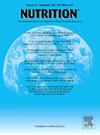鞣花酸通过调节FoxO3和HNF1α抑制PCSK9来改善动脉粥样硬化
IF 3.2
3区 医学
Q2 NUTRITION & DIETETICS
引用次数: 0
摘要
蛋白转化酶subtilisin/ keexin type 9 (PCSK9)通过促进低密度脂蛋白受体(LDLR)的降解,阻碍低密度脂蛋白胆固醇(LDL-C)的清除,导致LDL-C的积累,成为动脉粥样硬化的重要原因。鞣花酸是一种广泛存在于水果、蔬菜和坚果中的天然多酚,因其在预防和治疗心血管疾病方面的潜在作用而引起了人们的广泛关注。然而,鞣花酸通过抑制PCSK9减轻动脉粥样硬化的分子机制尚不完全清楚。材料与方法本研究通过体外HepG2细胞实验和高脂饮食诱导的ApoE - / -小鼠模型进一步验证鞣花酸的作用机制。结果鞣花酸显著降低PCSK9的表达和分泌,上调LDLR蛋白水平;其机制与抑制肝细胞核因子1α (HNF1α)表达,促进叉头盒O3 (FoxO3)表达增加有关。此外,鞣花酸可以减少高脂肪饮食诱导的小鼠主动脉斑块沉积;与体外实验结果一致,鞣花酸通过抑制HNF1α和提高FoxO3表达,降低PCSK9的表达和分泌,提高LDLR蛋白水平。综上所述,本研究表明鞣花酸通过调节HNF1α和FoxO3抑制PCSK9,从而提高LDLR水平,缓解动脉粥样硬化。这一发现不仅巩固了植物性饮食预防心血管疾病的科学基础,也为开发基于天然多酚的功能食品和营养干预策略提供了重要方向。本文章由计算机程序翻译,如有差异,请以英文原文为准。

Ellagic acid ameliorates atherosclerosis by inhibiting PCSK9 through the modulation of FoxO3 and HNF1α
Introduction
Proprotein convertase subtilisin/kexin type 9 (PCSK9) hinders the clearance of low-density lipoprotein cholesterol (LDL-C) by promoting the degradation of the low-density lipoprotein receptor (LDLR), leading to the accumulation of LDL-C and thus becoming an important cause of atherosclerosis. Ellagic acid, a naturally occurring polyphenol widely present in fruits, vegetables, and nuts, has attracted significant attention due to its potential role in the prevention and treatment of cardiovascular diseases. However, the molecular mechanisms by which ellagic acid alleviates atherosclerosis by inhibiting PCSK9 are not fully understood.
Materials and Methods
This study further validated the mechanism of action of ellagic acid through in vitro HepG2 cell experiments and a high-fat diet-induced ApoE−/− mouse model.
Results
The results showed that ellagic acid significantly reduced the expression and secretion of PCSK9 while upregulating LDLR protein levels; its mechanism is related to the inhibition of hepatocyte nuclear factor 1α (HNF1α) expression and the promotion of forkhead box O3 (FoxO3) expression increase. Additionally, ellagic acid reduced aortic plaque deposition in mice induced by a high-fat diet; consistent with the in vitro experimental results, ellagic acid lowered the expression and secretion of PCSK9 and elevated LDLR protein levels by inhibiting HNF1α and increased FoxO3 expression.
Conclusions
In summary, this study demonstrates that ellagic acid inhibits PCSK9 by regulating HNF1α and FoxO3, thereby increasing LDLR levels and alleviating atherosclerosis. This finding not only consolidates the scientific basis of plant-based diets for preventing cardiovascular diseases but also provides an important direction for developing functional foods and nutritional intervention strategies based on natural polyphenols.
求助全文
通过发布文献求助,成功后即可免费获取论文全文。
去求助
来源期刊

Nutrition
医学-营养学
CiteScore
7.80
自引率
2.30%
发文量
300
审稿时长
60 days
期刊介绍:
Nutrition has an open access mirror journal Nutrition: X, sharing the same aims and scope, editorial team, submission system and rigorous peer review.
Founded by Michael M. Meguid in the early 1980''s, Nutrition presents advances in nutrition research and science, informs its readers on new and advancing technologies and data in clinical nutrition practice, encourages the application of outcomes research and meta-analyses to problems in patient-related nutrition; and seeks to help clarify and set the research, policy and practice agenda for nutrition science to enhance human well-being in the years ahead.
 求助内容:
求助内容: 应助结果提醒方式:
应助结果提醒方式:


